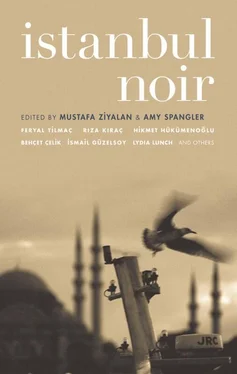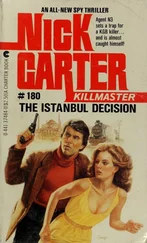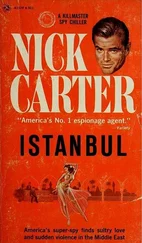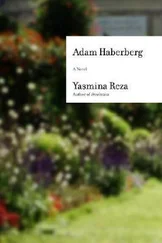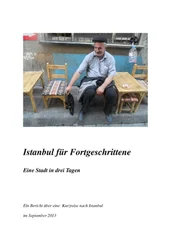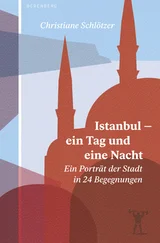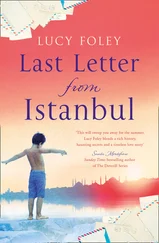I started looking out the window to escape the gloomy atmosphere of the bus; the workers were leaving the pharmaceutical, ceramic, lightbulb, and textile factories on the east side of Büyükdere Avenue and heading home. Behind the green hills of the west side were the villas of the rich and famous, and huge construction sites of apartment blocks in the making.
It was at that moment, at that corner, that I began crying.
For the first time in my life, I felt that something was changing, but I wasn’t sure what. I’d started sobbing when my father peered at me with a look of fear on his face that I’d never seen before.
“What’s wrong, Sadık?” he asked.
I couldn’t tell him; I didn’t know. It could hardly be a coincidence that the avenue dividing the rich from the poor, the luxurious apartment blocks from the shanties, the city from the village, had been named Büyükdere — the “large brook.” But I didn’t really know what that meant, so I banished all my confused thoughts to the dark recesses of my mind.
I was on the thirty-fifth floor of the skyscraper, facing the avenue. Between the city and me was a two-way mirror, separating the accused from the witness. But which of us was which, I couldn’t tell.
To my left was the factory stop, where I cried as a child, in its new guise: a main thoroughfare clogged with traffic, despite six lanes and an underpass at the intersection. And on my right, a mesmerizing Bosphorus view, enough to drive one to obsession.
Some spirit was whispering my brother’s last words, which were stuck in my child’s mind like a rusty knife. Back then Büyükdere Avenue was still long, but it didn’t have much traffic; you could amble across it, from one side to the other.
“Take a good look at this avenue, Sadık,” my big brother had said to me; I was just starting elementary school. “It’s a border, a border that shows which class you belong to.”
The only kind of class I knew about was the one where I’d learned to read and write and do arithmetic. I didn’t understand what my brother was trying to say, not until much later, when I enrolled in the police academy.
The pain of those memories was always with me. Years later, I finally understood what my brother was trying to tell me, but it was too late; I felt classless.
The Bosphorus side of the avenue was full of luxurious apartment complexes, paved roads, fancy playgrounds, and glamorous shopping centers. The east side — Gültepe, Çeliktepe, and Sanayi Mahallesi — was a dump where the hopeless, the poor, laborers, immigrants from villages near and far, and Gypsies took refuge. It was a black hole.
I didn’t stay long in that apartment with my father, stepmother, and stepsister. Two years later I moved in with my aunt in Ankara. Ankara was heavy, it was stone; it weighed upon me.
The door opened. İlhan Bey, a tall man in his fifties, with short hair and a bony, smiling face, walked in. He approached me with quick steps that hardly suited a man of his stature.
“I’m sorry to have kept you waiting, Sadık Bey,” he said as he shook my hand. “We’re so busy these days, and unfortunately I’ve got another meeting that I must attend in just a few minutes.”
I simply smiled in response. His hands were like ice, and I felt oddly unnerved; I’d never felt like that before.
He invited me to sit at the long conference table.
“What can I do for you?”
His tie was sticking out of his jacket; he tucked it back in. It was just the two of us sitting next to each other, but for some reason it felt like all the other chairs at the table were occupied too. My eyes wandered over the empty chairs and up to the cameras. İlhan Bey was smiling. I kept waiting for him to look at the watch he was covering with his right hand, but he insisted on focusing his attention elsewhere.
“I wanted to talk to you about the body found on the twelfth floor four days ago.”
İlhan Bey didn’t budge. He just kept looking at me, silently.
“You knew him, didn’t you?”
“Of course I did,” he replied. “Murat Bey and I worked together for years on the board of directors. I don’t know what to say. You never know when your time will come.” He was still wearing the same expression as he said these words.
“You probably have your suspicions about who killed him, don’t you?”
“Killed him?” he asked. He didn’t seem surprised by my question, though. He didn’t look angry or agitated either.
“That’s what we think, sir. And I did a background check on you.”
“You needn’t have gone to the trouble,” he said, smiling. “All you had to do was ask; I would have told you whatever you wanted to know.”
“It must be a tough job, being vice president of the firm.”
He finally raised his arm and looked at his watch. “I’m sorry, Sadık Bey, but I don’t have much time. Can you please get to the point?”
“I could’ve called you in to the station. In fact, I could take you in right now. So please don’t make a fuss if I take a few extra minutes of your time.”
“I’m trying to be reasonable. I’m happy to hear you out. But there is no way you are taking me anywhere. You can be sure of that.” The determined look in his eyes seemed to imply that he had friends in high places.
“You were born in Çeliktepe. You attended Robert High School and then...”
“I graduated from Bosphorus University. Did my doctorate in America. Worked with some of Turkey’s biggest business magnates. I know my own life story, Sadık Bey .”
I smiled.
“Do you know who you are?” he asked, his voice calm as could be. He continued: “ I know who you are, Sadık Bey .”
“Really?” He was mocking me.
“Yes, I do.”
“Well, all you need to know is that I’m a policeman and you’re a suspect!”
“So you say. But the truth of the matter is, I couldn’t care less about Murat Bey’s death, and you can’t pin a thing on me, Sadık Bey. Let’s be frank. If there’s something you have to say to me, just come out and say it. I’m wasting precious time here.”
There was plenty to say, but at that moment I felt it was still too early. I stood up. İlhan Bey peered at me for a moment before rising to his feet as well.
“Thank you, İlhan Bey,” I said, extending my hand.
“Is that it?” He seemed a bit unsettled.
“That’s it,” I said.
I shook his cold hand again, and he thanked me. He walked to the conference room door and opened it. As he started to walk out, I called after him.
“That makes five murders,” I said. “I’m not going to let you get away with a sixth.”
His hand was still on the door handle. He squared his shoulders and his face flashed red with anger. He looked arrogant. He closed the door and took two steps toward me.
“I knew your brother, Sadık Bey. He was a few years older than me, and he was my big brother too. When he pointed a gun at someone, he fired; but you — you’re just trying to corner me with a pistol of blanks. I really don’t know how it is that we didn’t meet when you were a kid. There was something your brother used to say: If you’re going to do something, do it with your body and your soul .”
I took a long look at his face.
I left the skyscraper through exit number four and walked toward a fountain flanked by ugly, stylized lion statues. I lit a cigarette. I could tell I was being followed; I could feel it.
My cell phone rang. It was Faruk. “Where are you, sir?” he asked. I told him to go on home. My hotel was nearby.
It was starting to get dark. I began walking, up the stairs and to the top of the hill. I remembered this place. We used to come here to fly kites or play ball sometimes. It was a soccer field of natural grass, but once we found a woman’s body here; the grass was yellow and her head had been smashed with a stone.
Читать дальше
